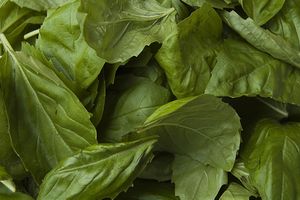Note: This is a project under development. The articles on this wiki are just being initiated and broadly incomplete. You can Help creating new pages.
Difference between revisions of "Ocimum basilicum - Basil leaves"
(→Common names) |
(→Uses) |
||
| Line 7: | Line 7: | ||
==Uses== | ==Uses== | ||
| − | {{Uses| | + | {{Uses|colic}}, {{Uses|constipation}}, {{Uses| anxiety}}, {{Uses| sleep difficulties}}, {{Uses|migraine}}, {{Uses|fever}}, {{Uses|colds}}, {{Uses|flu}}, {{Uses|arthritis}}, {{Uses|cough}}, {{Uses|bad breath}}. |
==Parts Used== | ==Parts Used== | ||
Revision as of 15:01, 6 April 2018
Basil leaves also called great basil, Ocimum basilicum or Saint-Joseph's-wort, is a culinary herb of the family Lamiaceae (mints). It is also called the "king of herbs" and the "royal herb". The name "basil" comes from Greek basilikón phutón "royal/kingly plant". This medicinal herb can help with flatulence, lack of appetite, cuts, and scrapes.Harvest the young leaves of this annual plant as needed.
Contents
Uses
colic, constipation, anxiety, sleep difficulties, migraine, fever, colds, flu, arthritis, cough, bad breath.
Parts Used
Chemical Composition
concentrations of linalool and methyl chavicol (estragole), in a ratio of about 3:1. Other constituents include: 1,8-cineole, eugenol, and myrcene, among others. The clove scent of sweet basil is derived from eugenol. The aroma profile of basil includes 1,8-cineole and methyl eugenol.[1]
Common names
| Language | Common name |
|---|---|
| Kannada | Tulasi |
| Hindi | Ban tulsi, Jangli tuls |
| Malayalam | Thulasi, Sivathulasi, Krishnathulasi |
| Tamil | Tulaci ilaikal |
| Telugu | Tulasi akulu |
| Marathi | NA |
| Gujarathi | NA |
| Punjabi | NA |
| Kashmiri | NA |
| Sanskrit | Thulasha |
| English | Basilie, Sweet Basil |
Habit
Identification
Leaf
| Kind | Shape | Feature |
|---|---|---|
| simple | silky | Fresh basil leaves have a strong and characteristic aroma, not comparable to any other spice, although there is a hint of cloves traceable |
.[2]
Flower
| Type | Size | Color and composition | Stamen | More information |
|---|---|---|---|---|
| Unisexual | 2-4cm long | white | 4 | flowers are arranged in a terminal spike |
Fruit
| Type | Size | Mass | Appearance | Seeds | More information |
|---|---|---|---|---|---|
| seeds upto 5 | {{{6}}} |
Other features
List of Ayurvedic medicine in which the herb is used
- Vishatinduka Taila as root juice extract
Where to get the saplings
Mode of Propagation
How to plant/cultivate
Basil grows between 30–130 cm (12–51 in) tall, with opposite, light green, silky leaves 3–11 cm (1.2–4.3 in) long and 1–6 cm (0.39–2.36 in) broad. The flowers are small, white in color and arranged in a terminal spike. Unusual among Lamiaceae, the four stamens and the pistil are not pushed under the upper lip of the corolla, but lie over the inferior lip. After entomophilous pollination, the corolla falls off and four round achenes develop inside the bilabiate calyx.
Commonly seen growing in areas
tropical, Mediterranean region.
Photo Gallery
References
External Links
- Pages that are stubs
- Ayurvedic Herbs known to be helpful to treat colic
- Ayurvedic Herbs known to be helpful to treat constipation
- Ayurvedic Herbs known to be helpful to treat anxiety
- Ayurvedic Herbs known to be helpful to treat sleep difficulties
- Ayurvedic Herbs known to be helpful to treat migraine
- Ayurvedic Herbs known to be helpful to treat fever
- Ayurvedic Herbs known to be helpful to treat colds
- Ayurvedic Herbs known to be helpful to treat flu
- Ayurvedic Herbs known to be helpful to treat arthritis
- Ayurvedic Herbs known to be helpful to treat cough
- Ayurvedic Herbs known to be helpful to treat bad breath
- Herbs with seeds used in medicine
- Herbs with leaves used in medicine
- Herbs with common name in Kannada
- Herbs with common name in Hindi
- Herbs with common name in Malayalam
- Herbs with common name in Tamil
- Herbs with common name in Telugu
- Herbs with common name in Sanskrit
- Herbs with common name in English
- Habit - Shrub
- Index of Plants which can be propagated by Seeds
- Index of Plants which can be propagated by cuttings
- Herbs that are commonly seen in the region of tropical
- Herbs that are commonly seen in the region of Mediterranean region
- Herbs
